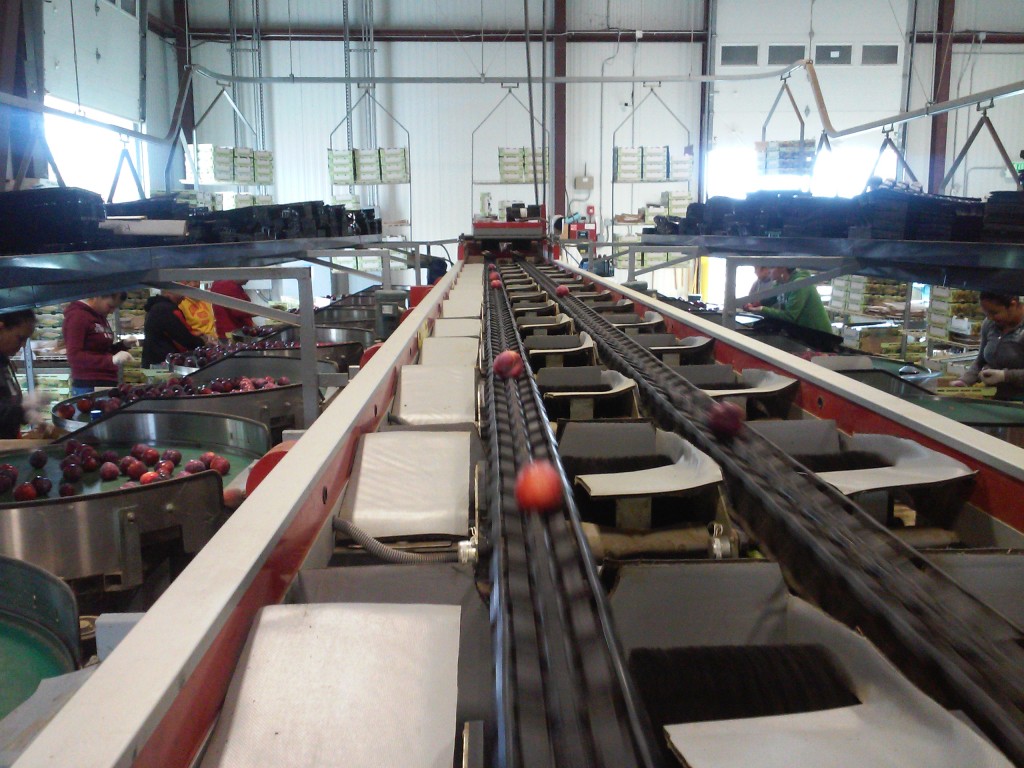 The Frog Hollow Farm “Packing Shed” is a fascinating operation. Unlike the name suggests, the Packing Shed is quite large, standing at 10,000 sq ft. Half of the space is a giant fruit cooler and freezer, the other half consists of the intricate packing machine. The packing operation requires a fine balance between hardworking, detail oriented individu- als, and the delicate mechanical sorting process.
The Frog Hollow Farm “Packing Shed” is a fascinating operation. Unlike the name suggests, the Packing Shed is quite large, standing at 10,000 sq ft. Half of the space is a giant fruit cooler and freezer, the other half consists of the intricate packing machine. The packing operation requires a fine balance between hardworking, detail oriented individu- als, and the delicate mechanical sorting process.
The packing shed requires 28 people to operate at full capacity. These individu-
als ensure ripe Frog Hollow fruit are sent to market in pristine form. During peak season, packing occurs 6 days a week and 800-3,000 lbs of fruit are packed per day. Frog Hollow produces 2 million pounds of fruit annually and all of it passes through the hands of the packing shed.
In my time observing the packing operation, I was impressed to see that each piece of Frog Hollow fruit passes through many stages of human and mechanical sort- ing, ensuring the highest quality fruit ends up in the proper destination. The op- eration starts with a team of 25 pickers out in the field, who climb up and down the ladders to rapidly fill their picking totes with fruit. The totes are then loaded on an electric cart and transported to the packing shed. Next, three workers share the job of loading the totes onto the conveyer belt that leads into the shed. These three individuals have a strenuous job, as they manually lift every bin of fruit that is produced at the farm. Next, two people stand at the entrance of the conveyer belt, removing any fruit they deem to be “kitchen grade” or destined straight for the compost. This kitchen grade fruit may be bruised, over ripe or damaged in some way, and becomes conserves or pastries in the kitchen. The composted fruit is trans- ported out to the compost piles, where it provides important sugars and nutrients to speed up the composting process. The remaining fruit makes its way onto the sorting belts. These belts are complete with weight sensors that are programmed to differentiate fruit size based on weight. The machine operator re-programs the sen- sors, depending on the size and density of fruit packed that day. The sorting belts are designed to handle stone fruit very gently. Each individual fruit rests in its own cup until it is collected at a packing station with like-sized fruit. The fruit is never stacked or bumped, in order to insure ripe fruit arrives at the consumer in perfect condition. Once at the various packing stations, the fruit is carefully packed by hand into boxes, and once again checked for quality. Any remaining kitchen grade fruit is sent back, and then the boxes are loaded straight on to delivery vehicles, destined for markets all over the Bay Area.
Some FHF fruit is so delicate that the packing machine cannot be used. For instance, the Suncrest peaches are not quite round; they have a pointy tip on the bottom. The fruit “cups” can cause these points to be smashed, so the Suncrest must be packed completely by hand. This is also the case with the oblong pears, and apricots and cherries are altogether too fragile for the machine.
